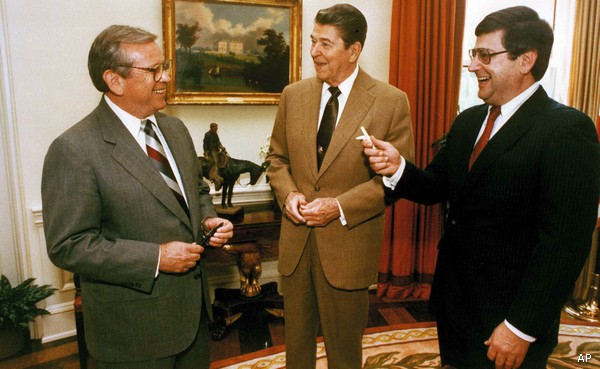Reams of data and analysis in recent years have shown how America’s political system is broken, how hyper-partisanship has ruined good-government policy initiatives and put Capitol Hill in constant gridlock.
A tribal, “Yea Team” mentality among voters on the left and right has created a political polarization that is so stark that members of Congress overall are about as respected as used car salesmen. Somehow along the path of the past two decades, doctrinaire political thinking – a devotion to party that resembles religious faith – tempted voters into thinking that it has always been this way, give or take.
On the far left, zealots seem to believe that Bernie Sanders is the logical successor of JFK, LBJ or even Jimmy Carter.
On the far right, ultraconservatives hoist Ronald Reagan on high as the ultimate rock-ribbed conservative who stuck to his guns. Ken Duberstein, Reagan’s chief of staff for several years, appeared on CBS’ “Face The Nation” on Sunday and destroyed that notion. In fact, Duberstein related that Reagan was always open to compromise with Democrats and frequently belittled the true believers on the left and right.
According to Duberstein, Reagan’s approach to the give-and-take of negotiating with House Democrats was this: “’I’ll take 80% every time … that’s what governing is all about.’ Reagan understood that the far left and the far right, as he used to remind us, are ‘professional bitchers.’
“They don’t want to be satisfied. That’s how they get their members. That’s how they get their money. So, get what you can, get that 80%. Figure out how to build a (congressional) coalition that gets you that, and then keep moving. And don’t worry about the far left or far right.”
Duberstein’s recollections fit nicely with a recent piece about our current state of dysfunctional politics written for Forbes magazine by a former corporate CEO, Katherine Gehl, and a professor at Harvard Business School, Michael Porter.
Gehl and Porter make the case that the U.S. has betrayed our Constitution as the governing process increasingly is dominated by a political-industrial complex, a closed system, a duopoly tightly controlled by the Democratic and Republican parties. The parties, in turn, are controlled by special interests, lobbyists, pollsters, consultants, think tanks, super PACs, and the media — largely centered on particular partisan-based TV shows, talk-radio, websites and blogs.
“Over the last several decades,” they wrote, “the American political system has been slowly reconfigured to serve not the public interest, but rather the interest of private, gain-seeking organizations: our major political parties and their industry allies.”
The goal on each side is absolute power. The two political parties exist almost exclusively to win elections, not to accomplish any pragmatic improvements for the country. As a result, the preferences of the average voter, sucked in by cheerleading for their chosen team, have “a near-zero impact on public policy.”
At a time when our largest and fastest-growing bloc of voters are independents – those who refuse to kow-tow to either party – the Democrats and Republicans are obsessed with demonizing the opposition.
What’s more, Gehl and Porter argue that the us vs. them partisan politics of the 21st Century has led our system of governance far astray from its origins:
It wasn’t always that way. America’s political system was long the envy of the world. The system advanced the public interest and gave rise to a grand history of policy innovations. Today, however, it serves as only a barrier to solving nearly every important challenge our nation needs to address.
The Harvard Business School’s project on U.S. competitiveness found that Washington has made virtually no progress on any of the essential policy steps needed to restore prosperity and growth. A broken political system has suddenly become the greatest threat to our nation’s future.
So how did we get here? In part, by stealth. Over the last several decades, the … (political) players have put in place a set of rules and practices that, while largely unnoticed by the average citizen, have enhanced their power and diminished our democracy.
Indeed, America’s current political system would be unrecognizable to our Founders. Many of its day-to-day components have no basis whatsoever in the Constitution — which offers no mention of political parties, party primaries, caucuses, ballot access rules, segregated congressional cloakrooms, party-determined committee assignments, filibuster rules, and countless other practices that drive today’s dysfunction. John Adams, our second president and one of the most astute thinkers among America’s founders, even warned the upstart nation against slipping into a duopoly, saying, “There is nothing which I dread so much as a division of the republic into two great parties, each arranged under its leader, and concerting measures in opposition to each other.”
Photo: White House photo; Duberstein, right, chats with Reagan and Senate Majority Leader Howard Baker



